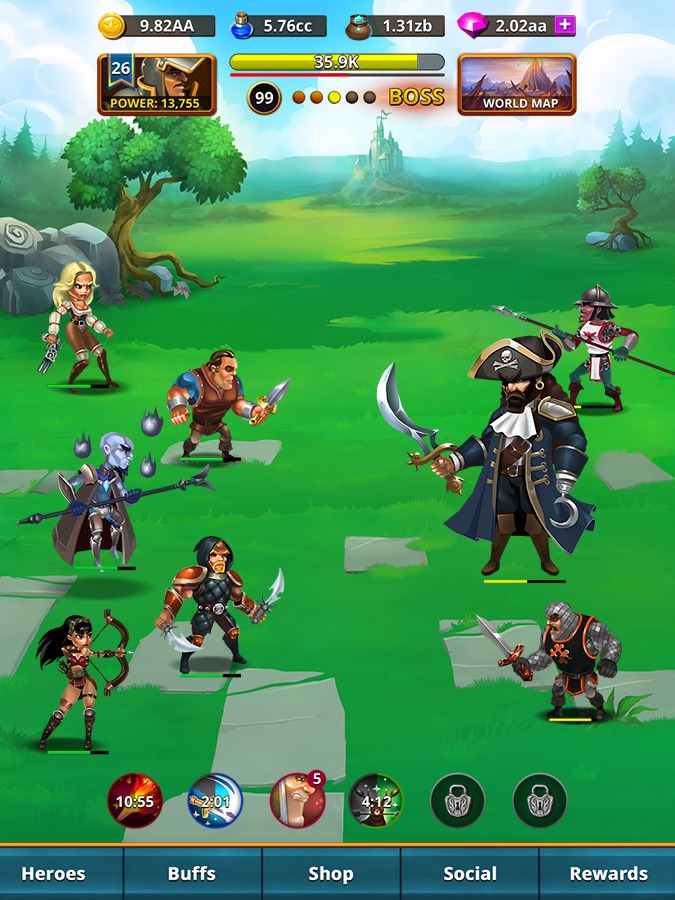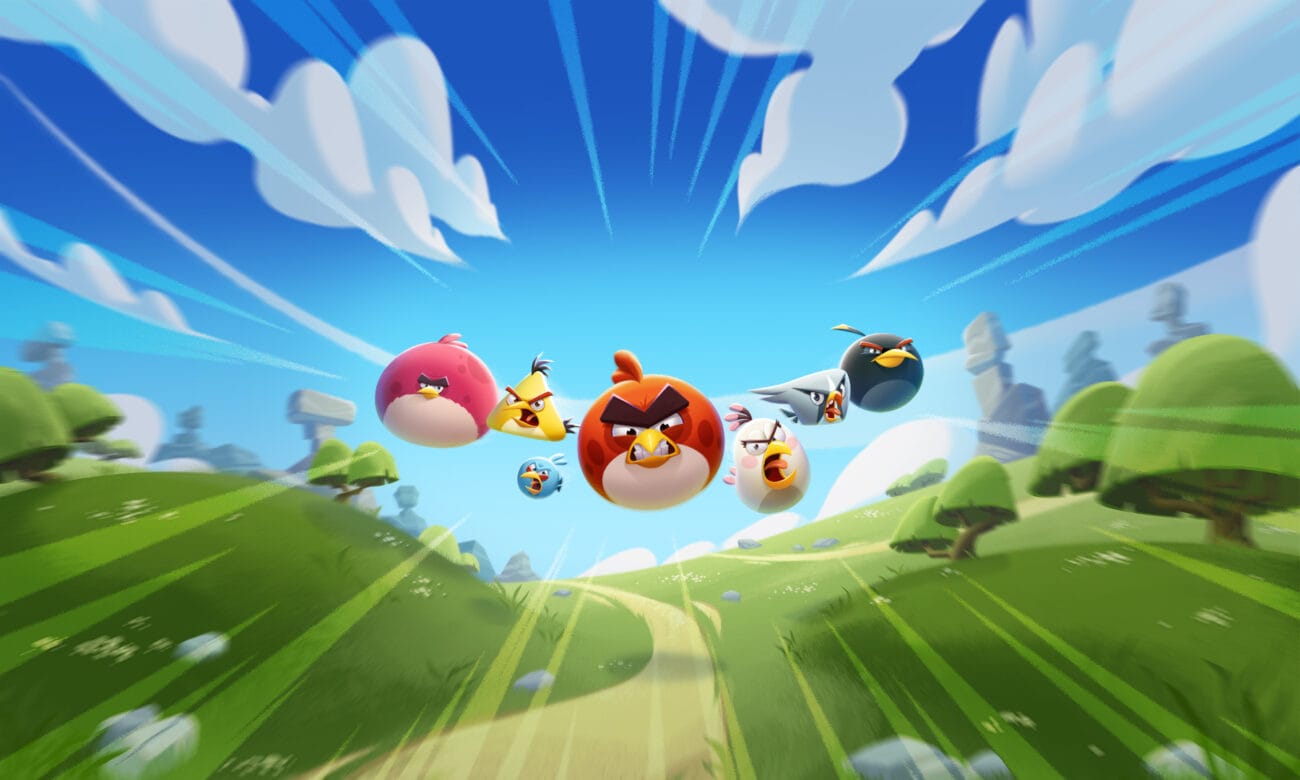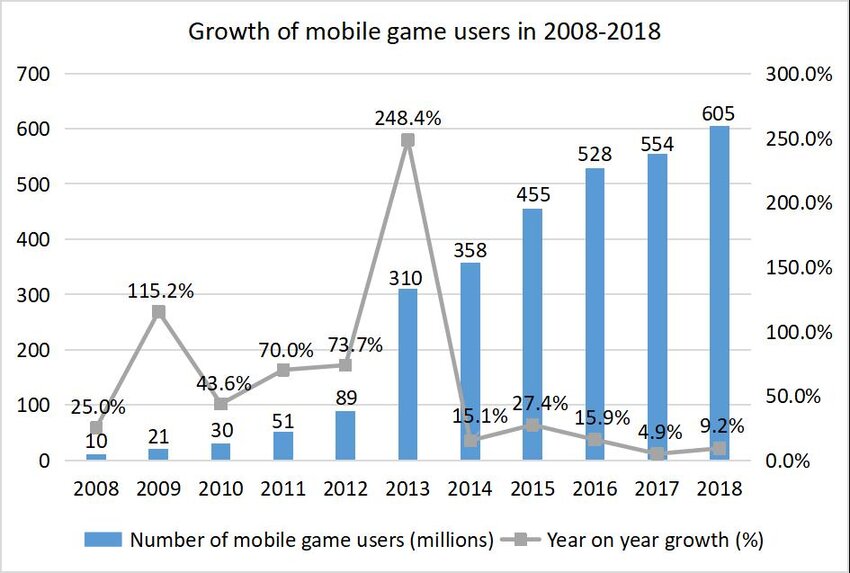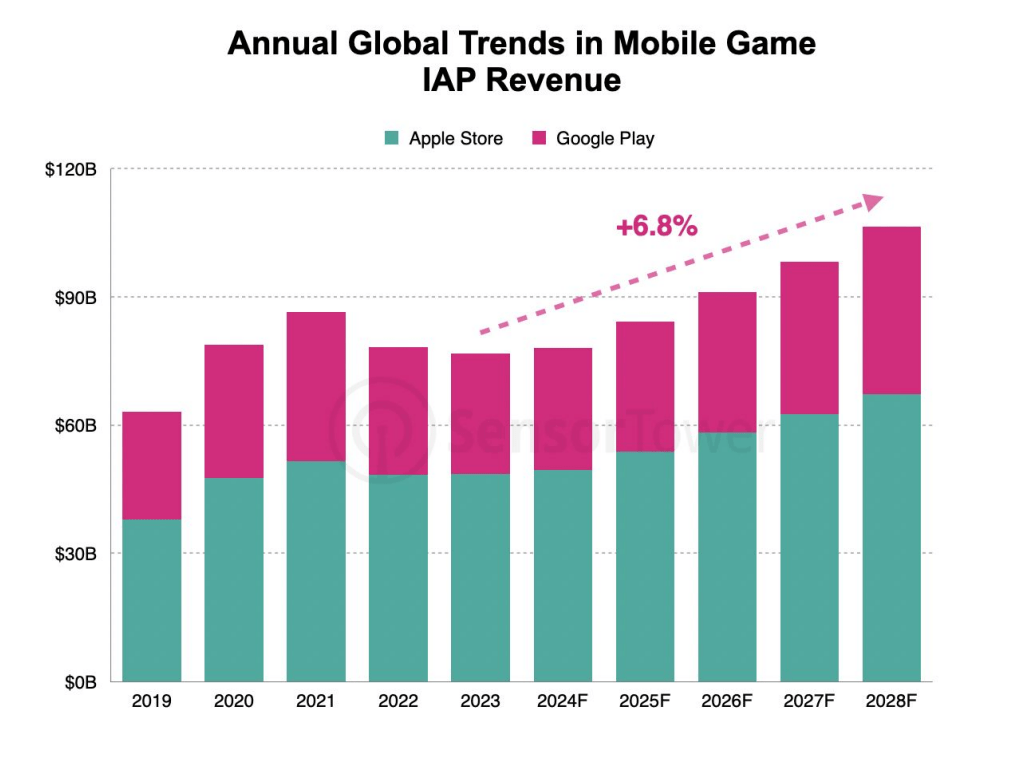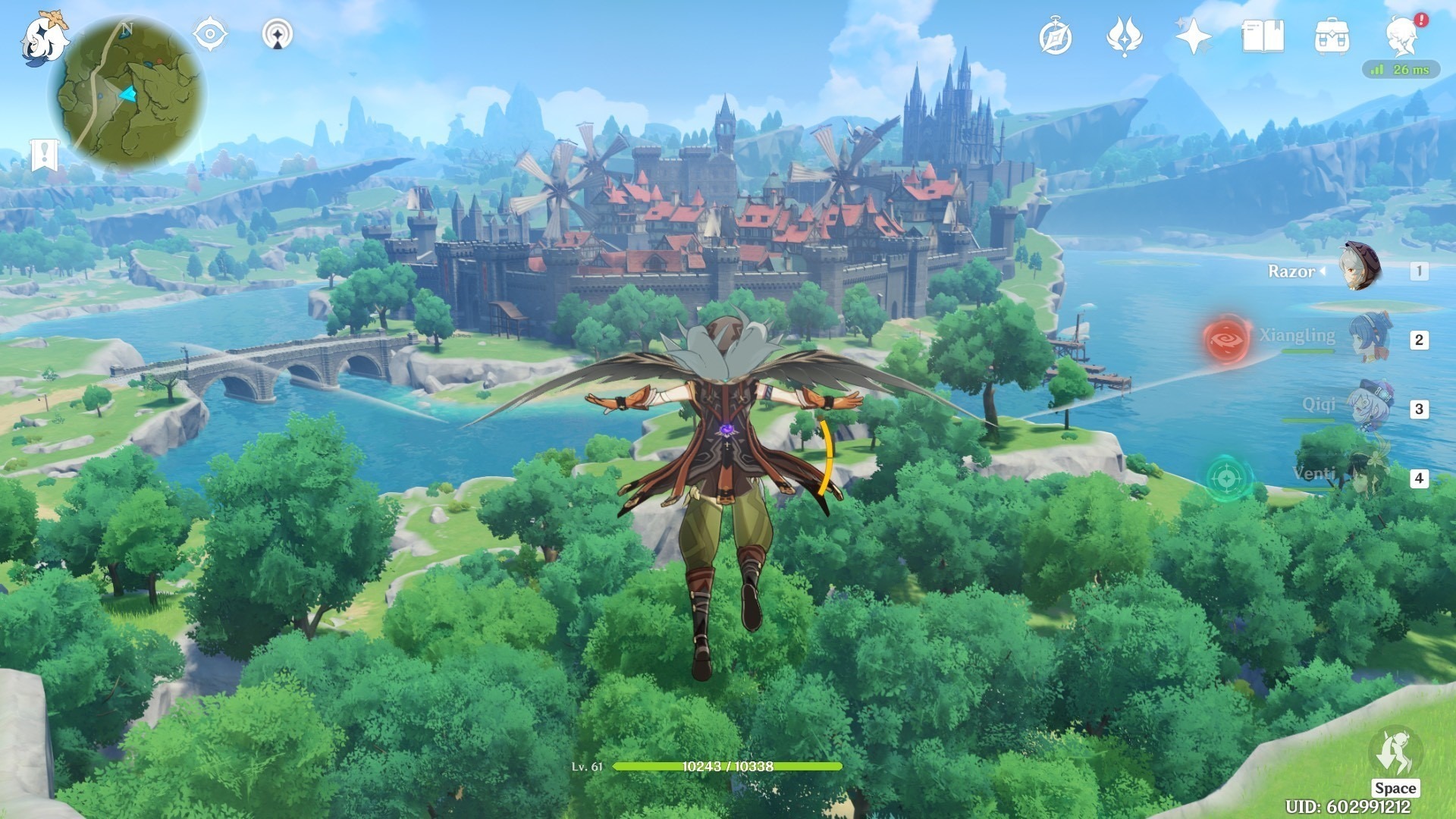In the first part of our mobile games guide, we will look at the key companies within the sector.
Mobile Games Companies List
The companies listed below are some of the largest and most influential mobile games companies in the world:
Playtika
Headquartered in Herzliya, Israel, Playtika is best known as a developer of social casino games and known for titles such as Bingo Blitz and Slotomania. In 2023, the company had revenues of £2.01bn.
Supercell
Founded in 2012 and based in Helsinki, Finland, Supercell is one of the biggest mobile games companies in the world and known for big hits like Hay Day and Clash of Clans. Supercell revenues in 2023 were €1.7bn.
King
King is headquartered in Stockholm and is best known for the hit game Candy Crush Saga. In 2016, King was bought by Activision Blizzard for $5.9bn which itself was acquired by Microsoft in 2023. In 2023 King achieved revenues of $1.42bn.
Dream Games
Dream Games is an Istanbul-based mobile games developer founded in 2019. The company has risen quickly to become one of the major players in the sector. Smash hit Royal Match has proven to be a huge success for the company. The company has many ex-Peak Games and ex-King employees who have used their experience in the sector to help the company to grow swiftly.
Zynga
Founded in 2007, Zynga has been one of the pioneers of social and mobile gaming. Zynga went public in 2011 and was acquired by Take-Two Interactive in 2022 for $12.7bn. Zynga’s annual revenue in 2021 were $2.8bn prior to the acquisition.
Scopely
Scopely, founded in 2011 and based in Los Angeles, has published games across various genres, including puzzle and strategy. Major titles include Monopoly Go! launched in 2023, and The Walking Dead: Road to Survival. In 2023, Savvy Games Group, owned by Saudi Arabia’s Public Investment Fund (PIF), acquired the company for $4.9bn.
Playrix
Playrix is a free-to-play mobile game developer known for puzzle games like Gardenscapes and Homescapes. The company was founded in 2004 in Russia but today is headquartered in Ireland. Playrix generated approximately $1.83bn in revenue in 2023. The founders, brothers Dmitry Bukhman and Igor Bukhman, still own the company and have not raised outside funding.
Pixel United
Pixel United, a London-headquartered mobile games company, was formed in 2021 when gambling company Aristocrat Leisure rebranded its mobile division. Aristocrat Leisure had previously acquired Product Madness, Plarium, and Big Fish Games in 2012, 2017, and 2018, respectively, and combined them to form Pixel United. Product Madness specializes in social casino games. The company generated revenues of $2.65bn in 2023.
————————————————————————————
The following companies have been highly acquisitive in buying mobile games businesses;
EA
Playdemic, Glu Mobile (2021), PopCap (2011) and Playfish (2009)
TakeTwo Interactive
Social Point (2016), Nordeus (2021), Zynga (2022)
Stillfront Group
Bytro Labs (2016), Goodgame Studios (2017), Imperia Online (2018), KIXEYE (2019), Storm8 and Sandbox Interactive (2020), and Moonfrog (2021).
Tencent
Acquisitions: Riot Games (2011), Miniclip (2015), Supercell (2016)
Investments: Epic Games (2013), Netmarble (2018), Krafton, Kakao Games (2018), Voodoo (2020), Playtonic Games (2021)
Savvy Games
Scopely (2023)
Ubisoft
Kolibri Games (2020), Green Panda Games (2019), Ketchapp (2016)
Supercell
Acquisitions: Space Ape Games (2017), Trailmix Games (2022)
Investments: Metacore (2018)
————————————————————————————
Here is a broader list of mobile games companies:
Voodoo
Voodoo is a mobile game developer based in Paris. The company was founded in 2013 and known for hypercasual games like Mob Control and Block Jam. The company is backed by investors like GBL and Tencent. In 2023, Voodoo reported $570m in revenues.
Peak Games
Peak Games is an Istanbul-based developer known for developing casual mobile games like Toy Blast and Toon Blast. It is founded in 2012 and was bought by Zynga in 2020 for $1.8bn (Zynga itself was acquired by Take Two Interactive in 2022). The company generated around $294.5m in 2023.
Metacore
Metacore is a Helsinki-based mobile game developer that launched its first game, Merge Mansion, in 2020. Since 2018, Supercell has invested a total of approximately €180 million in the company. Metacore acquired the rights from Supercell to develop the game Everdale, but later stopped development of the title, and returned the rights to Supercell in 2024.
Miniclip
Miniclip, founded in 2001 and based in Switzerland, began as a browser game company. Miniclip is best known for making casual games (often with a sports theme) such as 8 Ball Pool – the most popular pool game on mobile. Tencent acquired the company in 2015, and in 2021, Miniclip purchased SYBO, best known for the smash hit endless runner Subway Surfers.
Rovio
Rovio is a Finnish mobile games company best known for the Angry Birds franchise. Rovio was founded in 2003 by Helsinki University of Technology students Niklas Hed, Jarno Väkeväinen and Kim Dikert. Rovio went public in 2017 with a valuation of $1bn. In 2023, Sega bought Rovio for $776m, making it a subsidiary of its Sega Europe division.
Moon Active
Moon Active is an Israeli mobile game company founded in 2011. Specialized in developing social casino and casual games, its best known games are Coin Master and Travel Town. Moon Active has raised in total $426m by investors including Insight Partners.
Homa
Headquartered in Paris, Homa was founded in 2018 and develops hypercasual and casual mobile games. Some of its notable titles include All in Hole and Sky Roller. Homa also created a SaaS game development tool, Homa Lab, which supports game analytics, market insights, and testing. Homa is funded by investors including Quadrille Capital, Headline, and Northzone.
Wooga
Wooga is a Berlin-based mobile games company founded in 2009 by Jens Begemann. They are specialized in story-driven hidden object and puzzle games such as June’s Journey and Tropicats. In 2018, Wooga was bought by Playtika for $200m.
Ten Square Games
Ten Square Games is a Polish mobile game developer best known for two main games; Hunting Clash and Fishing Clash. Ten Square Games was founded in 2011 and has a revenue of over €100m in 2023. The company went public in 2018 on Warsaw Stock Exchange.
Gameloft
Paris-based company Gameloft was founded in 1999 by Michel Guillemot, one of the five co-founders of console game publisher Ubisoft. The company develops games for mobile, console, and PC platforms, with notable mobile hits including the Asphalt series of racing games and Minion Rush. In 2023, Gameloft’s revenue was €311m. Formerly a publicly traded company, Gameloft was acquired by media conglomerate Vivendi in 2016.
Tripledot Studios
London-based mobile games company Tripledot was created in 2017 and is known for developing solitaire and puzzle games. Some notable titles include Woodoku and Solitaire. They have raised over $200m in funding since 2021 and valued at over $1.4bn in 2022. Tripledot investors include 20VC, Access Industries and Lightspeed Venture Partners.
Tactile Games
Tactile Games was founded in 2008 in Copenhagen and develops casual puzzle games such as Lily’s Garden and Makeover Match. The company was valued at $432m in 2020. Tactile Games was founded in 2008 by CEO Asbjoern Soendergaard.
Azur Games
Azur Games, based in Cyprus, is a mobile game developer with a portfolio ranging from midcore PvP to hypercasual games. Founded in 2017, their leading games include Stack Ball and WormsZone.io.
Space Ape
Space Ape is a London-based mobile game company founded in 2012, and later acquired by Supercell. Space Ape Games have created a diverse range of games across genres including strategy, casual, arcade, and action. Hit games include Chrome Valley Customs (racing) and Beatstar (rhythm).
Trailmix
Formed in 2017 by ex-King duo Carolin Krenzer and Tristan Clark, Trailmix is a mobile game company focused on casual free-to-play games. Its hit game Love & Pies is a match-3 game that combines mystery-solving with dramatic story elements. In 2022, Supercell acquired a majority stake in Trailmix.
Rollic
Rollic is a Istanbul-based hyper-casual games developer founded in 2018. The company is known for titles such as High Heels! and Blob Runner 3D. Zynga acquired 80% of the shares in Rollic for $180m in 2020.
Deca Games
Deca Games is a Berlin-based mobile game publisher and developer. The company primarily focuses on acquiring the rights to free-to-play games and specialize in managing games from a live operations perspective. Some of their notable hits include Realm of the Mad God and Knights & Dragons. In 2020, the company was acquired by Embracer Group. Deca Games has subsidiaries including A Thinking Ape and CrazyLabs.
Kolibri Games
Kolibri Games is a Berlin-based mobile games developer known for developing idle games such as Idle Miner Tycoon and Idle Bank Tycoon. In 2020, Ubisoft acquired a 75% share of Kolibri with a valuation of €160m.
Madbox
Madbox is a French hypercasual mobile game developer founded by Maxime Demeure, Jonathan Hattab, Emily Keohane, and Jean-Nicolas Vernin in 2018. They have developed hit games including Stickman Hook and Dash Valley. The company is backed by venture capital investor Alven.
Nordeus
Nordeus is headquartered in Belgrade, Serbia. The company was founded in 2010 and known for its sports games. Nordeus is perhaps best known for its popular Top Eleven football management game and Golf Rivals Sports. In 2021, Take-Two Interactive acquired Nordeus for up to $378m.
Boombit
Polish mobile games developer Boombit was founded by Marcin Olejarz and Hannibal Soares in 2010. Boombit was listed on Warsaw Stock Exchange in 2019 and had total revenues of $58.7M in 2023. BoomBit creates games in a variety of genres including sports, driving, RPG and strategy. Some of their most popular games include Hunt Royale and Darts Club.
Huuuge Games
Huuuge Games creates multiplayer social casino games. Founded in 2014 and based in Berlin, the company is known for its hit titles like Huuuge Casino and Billionaire Casino. In 2023 Huuuge generated revenue of $283.4m.
MobilityWare
MobilityWare was founded in 1990 and publishes card and puzzle games. Headquartered in California, the company is known for games such as Solitaire and Spider Solitaire.
Outfit7
Outfit7 is a Slovenian mobile games company, best known for the Talking Tom and Friends franchise. My Talking Tom is a game where players raise a grey tabby cat called Tom. In 2017, Outfit7 was sold to Chinese company Jinke Entertainment Culture based in Zhejiang for $1bn.
Playstudios
Playstudios is a San Francisco-based mobile game developer known for puzzle and social casino games such as Tetris and myVEGAS Slots. Playstudios went public in 2021 on NASDAQ and had revenue of $310.9m in 2023.
SciPlay
SciPlay, based in Austin, Texas, specializes in free-to-play slots and bingo games for mobile and web platforms. Originally founded as the social gaming division of Light & Wonder (formerly Scientific Games) in 1997, it adopted the name SciPlay in 2019 and became an independent company. Light & Wonder reacquired the company in 2023. The company is known for hits like Jackpot Party Casino and Gold Fish Casino.
FunPlus
FunPlus was founded by Andy Zhong and Yitao Guan in Silicon Valley in 2010 and today is headquartered in Switzerland. FunPlus is best known as a developer of midcore RPG games like State of Survival and Frost & Flame.
Tencent Games
Tencent Games was founded in 2003 and is a game publishing subdivision of Tencent Interactive Entertainment, the digital entertainment division of Tencent Holdings. Based in Shenzhen, the company publishes free-to-play games in China, including Dungeon Fighter and ArchAge. Tencent Holdings owns Riot Games, Miniclip and various other mobile game companies.
NetEase Games
NetEase Games is the online games division of NetEase. NetEase Games is a mobile game developer and publisher known for strategy and RPG titles such as Knives Out and Blood Strike. It recorded revenues of $11.5b in 2023.
MiHoYo
Founded in 2012, MiHoyo is a Chinese mobile game developer and publisher based in Shanghai. The company is best known for its RPG games such as the Honkai series and Genshin Impact. In 2024, the company was valued at $23bn.
IGG
IGG is a Singapore-based games company originally founded in 2006 in Fujian, China. IGG is known for strategy and MMORPG games such as Lords Mobile and Castle Clash. In 2018, the company was listed on the Hong Kong Stock Exchange.
GungHo Online Entertainment
GungHo Online Entertainment is a Japanese game developer and publisher best known for Ragnarok Online and, more recently, the match-3 game Puzzle & Dragons. The company is listed on the Tokyo Stock Exchange and was owned by SoftBank Group until 2016.
Netmarble
Netmarble is a Korean mobile game developer and publisher founded in 2000. It is the parent company of Kabam and the major shareholder of Jam City. Netmarble has a diverse portfolio of games, including casual, RPG, and strategy titles. Some of its notable hits include Lineage 2: Revolution and MARVEL Future Fight.
Com2uS
Com2uS is a Korean mobile game developer founded in 1998. The company is known for its MMORPG hit series Summoners War, which launched in 2014. Com2uS was listed on the Korean Securities Dealers Automated Quotations (KOSDAQ) in 2007 and was later acquired by rival company Gamevil in 2013. Gamevil changed its corporate name to Com2uS Holdings in 2021.
Kakao Games
Kakao Games is a subsidiary of Kakao Corp, which owns the popular messaging app KakaoTalk in Korea. The company is known for its diverse range of games, spanning genres from puzzle to RPG, including Guardian Tales and Friends Town.
Cygames
Cygames, a subsidiary of CyberAgent, is a Japanese mobile games company. It achieved its biggest success with Uma Musume Pretty Derby, a horse-racing mobile game that has expanded into a multimedia franchise, including an anime series and manga adaptations.
Garena
Founded in 2009, Garena is a Singaporean mobile games company and a subsidiary of Sea Group. Garena focuses on the battle royal genre and probably best known for Free Fire, one of the biggest hits in Southeast Asia. Sea Group is traded on the NYSE.





